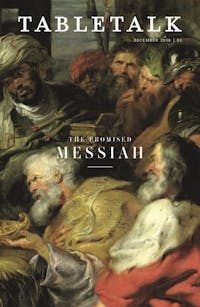
Request your free, three-month trial to Tabletalk magazine. You’ll receive the print issue monthly and gain immediate digital access to decades of archives. This trial is risk-free. No credit card required.
Try Tabletalk NowAlready receive Tabletalk magazine every month?
Verify your email address to gain unlimited access.
There is no doubt that Old Testament kingship reaches its climax with the rise of the Davidic monarchy. What is just as clear is that the promise of kingship did not begin with David. It goes back as far as Abraham. Recall that the Lord promised Abraham that “kings shall come from you” (Gen. 17:6), a promise that was reiterated with Jacob (35:11). This kingship promise takes on a prominent form in the final words of Jacob to his sons in Genesis 49, where he pronounces the blessing of dominion on Judah. Let’s consider this blessing of Jacob and how it anticipated the rise of kingship for the people of God.
In verse 8, Judah is made the object of praise and endowed with worldwide dominion. Verse 9 continues this portrayal of Judah’s rule by vividly depicting him as a young, growing lion that has hunted down its prey, has returned to its den with its kill, and rests in power where no one dares challenge him.
This leads to the intriguing images in verse 10. Jacob associates two symbols of kingship with Judah: a “scepter” (Num. 24:17; Isa. 11:4; Ps. 45:6; Zech. 10:11) and a “ruler’s staff” (Num. 21:18; Ps. 60:7). The phrase “from between his feet” is a euphemism for the male reproductive organ (Judges 3:24; 1 Sam. 24:3; Isa. 7:20) and thus represents Judah’s progeny. In other words, a Judean will always be a national commander of God’s people. This will remain true “until Shiloh comes” (Gen. 49:10, NKJV).
The figure of “Shiloh” has captured the interest of scholars throughout the ages, and various interpretations have been proposed. Some understand the sh as a relative pronoun and loh as “to him”; thus, “until he comes to whom it [the scepter/ruler’s staff] belongs.” Others see the sh as the rare Hebrew noun shay, meaning “tribute”; thus, “until tribute comes to him [Judah].” Still a third option is to understand the reference to “Shiloh” as the personal name of an outstanding future son of Judah. Other interpretations have been offered, but these three represent the most popular options. Regardless of the view, these three share a common theme: one outstanding individual in the line of Judah will establish his dominion that will not be limited to Israel; rather, “to him shall be the obedience of the peoples” (v. 10).
Although any of these messianic options is possible, I favor the view that sees “Shiloh” as a reference to a personal name. The Hebrew root sh-l-h occurs frequently in the Old Testament, meaning “ease, quiet, peace.” Thus, “Shiloh” is a figure who is in essence a prince of peace (see Isa. 9:6). The image of the prosperity of the peaceful bliss that he brings continues in Genesis 49:11–12. The universal reign of Shiloh results in the prosperity of his kingdom, where vines are in such abundance that donkeys can be bound to them instead of hedges. Wine, the fruit of vines, no longer needs to be preserved for special occasions. In the kingdom of Shiloh, it is so plentiful that it can be used for everyday chores, such as the washing of clothes (v. 11). In fact, drinks of pleasure, such as wine and milk, will be superabundant for all to enjoy (v. 12).

This picture of peace and prosperity, however, comes at a very high price—namely, the sacrifice of Shiloh Himself. There is allusion to such an act in the text. One is the imagery of the “blood of grapes” (v. 11; see Isa. 63:2). Another is the “donkey,” which in the ancient world was often commonly used in the ratification of loyalty oaths. The use of this term in this context suggests that Shiloh will bring peace at his own expense (see Gen. 15). This “donkey” is alluded to in a similar passage in Zechariah 9:9, where the messianic king enters the city of Jerusalem riding upon this donkey. The significance of Zechariah 9:9 is without doubt, since it is fulfilled in the entry of Jesus into the city of Jerusalem (Matt. 21:5). Thus, Christ entered Jerusalem riding on a beast that represented His pending sacrifice.
Although Genesis 49:8–12 is the record of the final blessing of Jacob to his son Judah, its reception in the history of redemption portrays it as a grand prophecy that finds its ultimate fulfillment in Jesus Christ. It says that royal authority will be associated with Judah and his family. This will reach a climactic point when one of his sons will come to establish universal peace and prosperity. Although peace was established by Judean kings such as David and Solomon, their reign could not establish it universally where “the obedience of the peoples” (v. 10) belonged to them, nor could they bring about a kingdom prosperity that provided eschatological abundance (vv. 11–12). They were a picture of a greater son of Judah, the true Prince of Peace, who brings the full blessing of His glorious kingdom. Jesus is that great Judean son, the messianic Shiloh whose death established “peace with God” (Rom. 5:1). He ascended to be with His Father but will return “with the armies of heaven” (Rev. 19:14) wearing a “robe dipped in blood” (v. 13) to defeat all those who dare to oppose Him. In our union with Christ, we are “fellow heirs with Christ” (Rom. 8:17) and await His return when He will establish the true heavenly homeland and we will wear white robes washed “in the blood of the Lamb” (Rev. 7:14).
